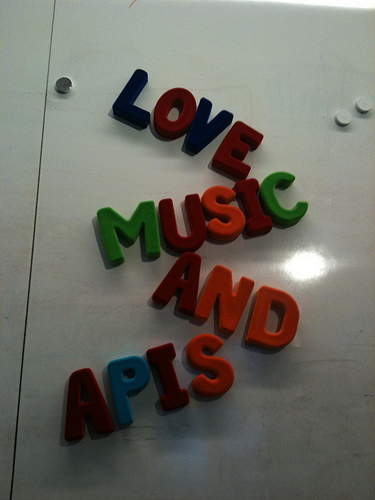In The Structure of Scientific Revolutions, Thomas Kuhn famously wrote about science undergoing “paradigm shifts”: that scientific change occurs in sudden upheavals. It’s normally not all that dramatic, even. What I’ve observed to happen is something like this: at a conference, someone will present evidence for an alternative explanation of data. Some people will listen, some will scoff, and some will go off to do more experiments. The next year, more people are on the side of the ‘novel’ explanation. Repeat for another year or two, and everyone is on board with the new idea.
Watching the music industry evolve and struggle and try to reinvent itself, on the other hand, reminds me of what Kuhn wrote about the humanties. “[A] student in the humanities has constantly before him a number of competing and incommensurable solutions to these problems, solutions that he must ultimately examine for himself.”
The Rethink Music conference, starting today in Boston, aims to give “creators, academics, and industry professionals” a chance to think and discuss some of these solutions for the music industry. A collaboration between the Berklee College of Music, Harvard’s Berkman Center for Internet and Society, and MIDEM, Rethink Music’s goal is to foster a dialogue between the ‘traditional’ music industry and the artists, researchers, and entrepreneurs who are exploring a musical universe that’s not a holdover from moving around shiny silver discs. The high-powered speaker lineup suggests that Rethink Music is on track: it includes artist management, lawyers, researchers (including Lawrence Lessig and Nancy Baym), CEOs of a host of companies including SonicBids and The Echo Nest, Kickstarter founder Yancey Strickler, and RIAA head Cary Sherman sharing a stage with Google’s senior copyright counsel Fred Von Lohmann, formerly of the EFF (I have high hopes for a deathmatch).
Rethink Music is quite unusual in how it’s bringing people from across the spectrum together. As a counterexample, at SXSW Interactive this year, I went to two panel discussions around metadata: the first featured researchers from UC Berkeley, and the second was organized by a representative of NARM (the music industry trade organization). Even though both panels were nominally on the same topic, they were worlds apart: one group was talking about things like crowdsourcing taxonomies of musical knowledge, and the other group was talking about linking MP3s with the release dates of albums. So I’m excited to see Larisa Mann, one of the researchers from Berkeley, on the Rethink Music lineup.
Unsurprisingly, perhaps, there is already some evidence of friction in this uneasy alliance of interests. Wayne Marshall, a DJ and a researcher in ethnomusicology at MIT, withdrew from the conference over the boilerplate language of the speaker contract (you can read his letter to the conference organizers here). Articles on Hypebot and Mashable took issue with the planned release of an ‘instant album’ by Amanda Palmer, Neil Gaiman, Ben Folds, and Damien Kulash of OK Go (Palmer’s response is here). But of course, the tensions are likely to be what makes Rethink Music an interesting few days.










